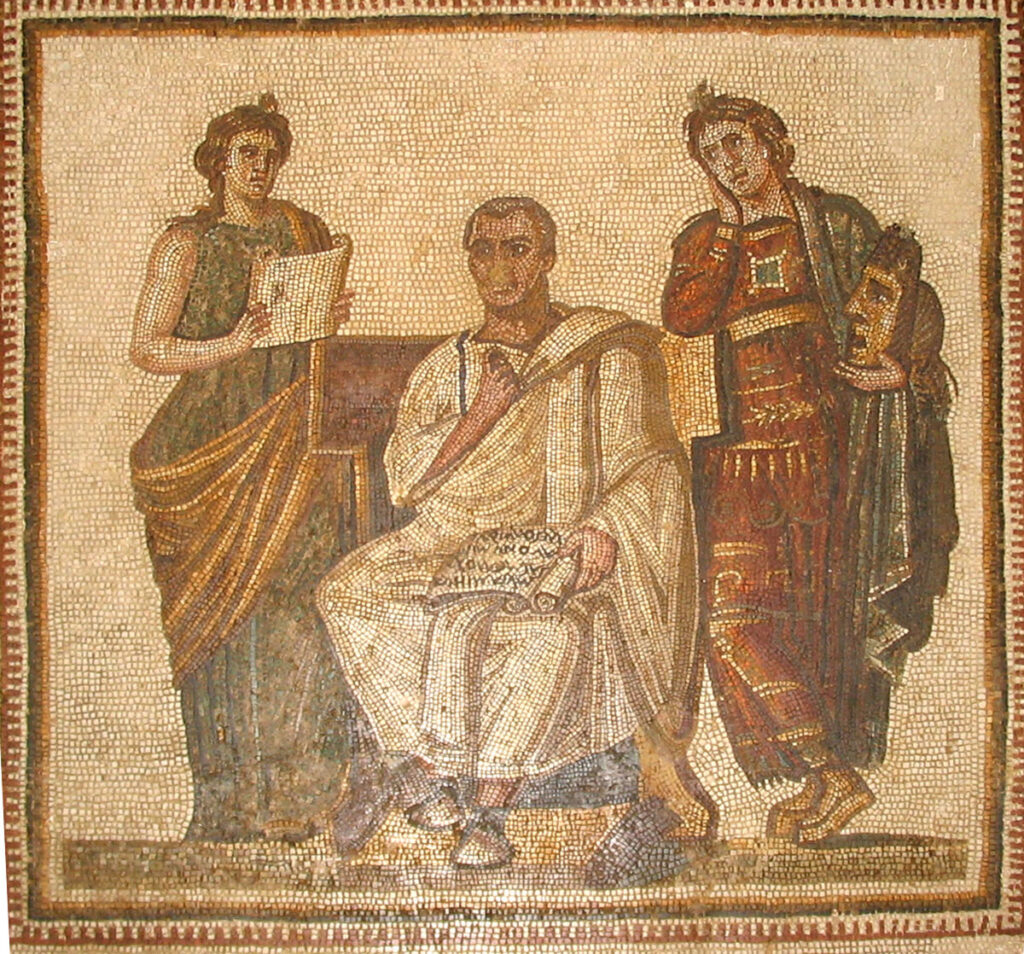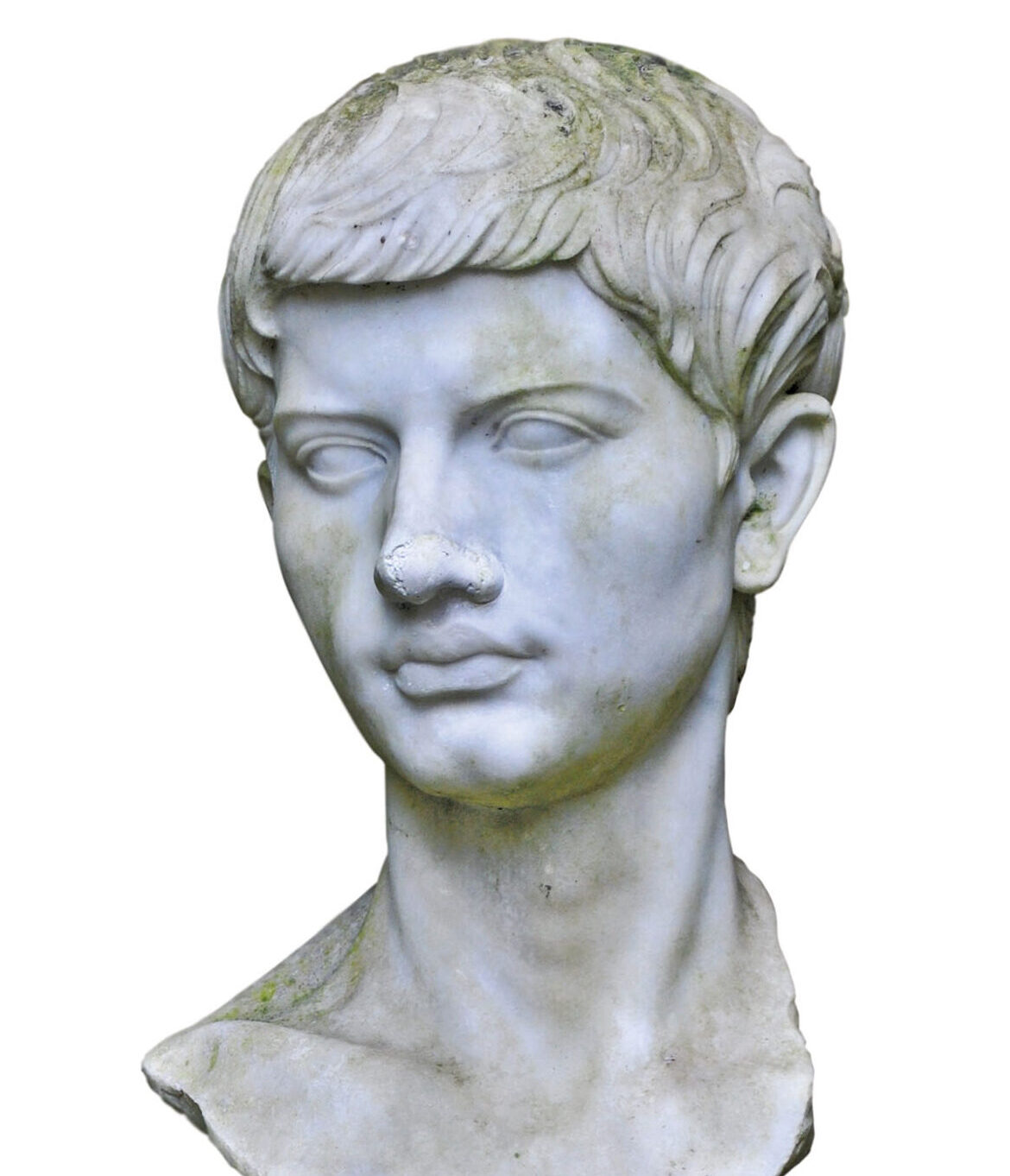Will the Real Vergil Please Stand Up?
Making sense of the life of a poet about whom we know so little

Great works of literature are sly and powerful beasts that pounce on their readers, grabbing them by the neck and shaking them back and forth. The young Augustine looks like a typical victim of Vergil’s Aeneid. The schoolboy being brought up as a Christian in fourth-century CE North Africa found the first-century BCE epic poem of pagan Rome the most impressive thing in his cultural life to date. Tellingly, his reaction shows no interest in the poem’s theme of individual sacrifice in the name of imperial destiny; rather, into middle age, the great theologian and founder of institutional Catholic monasticism remembered weeping for Dido, who commits suicide after her lover, Aeneas, abandons her at the end of Book IV.
When we react as intensely to a work of literature as Augustine did, we may feel compelled to know what events in the author’s life could have informed his imagination. There has to be, we are convinced, something about the author himself that is vital to that thing called literary achievement, some reason he brought into being a work so communicative and congenial. The lack of detail concerning ancient lives has led biographers to make up what they cannot find in their research and to overinterpret what they do find. For Vergil, who lived from 70 to 19 BCE, the biographical tradition started to veer out of control from the first and never corrected itself. In the ancient world, rumor, folklore, prejudice, whimsy, and inference from fictional works were habitual sources for biographical “fact.” The Athenian tragedian Euripides, a legend states, was torn to pieces in the woods by hunting dogs belonging to his patron, the king of semiwild Macedonia. The literary inspiration for this story might be the dismemberment of Pentheus at the hands of feral women in Euripides’s Bacchae, or the death of Hippolytus, dragged by spooked horses in the play named for him, though Euripides’s unpopularity in his native Athens no doubt helped the story along. As for Vergil, we know a great deal less about him than about the second most important poet of his era, Horace; Vergil was a private man by preference, but he also seems to have been accorded—no doubt with the help of powerful imperial patronage—a most un-Roman respect for his privacy. Since then, Vergil’s distance and blurriness as a human being have enticed people to read his life and his thinking so as best to suit their own lives and their own thinking.
The consequent distortions go far beyond the political—many are distortions related not only to Vergil’s life but also to how his greatest poem, the Aeneid, can most basically be read and used. Through the long period of late antiquity and for centuries after, the Aeneid was a school text. The poem is ostensibly “about” the establishment, accomplished at high cost, of the Roman nation through the providential survival and triumph of the refugee Aeneas. (The first Roman emperor, Augustus, claimed Aeneas as an ancestor.) But for centuries, the epic was mined for oratorical fuel, even though the author was, by all evidence, the quintessential anti-orator, living and creating in intense inwardness. And the classroom presentation of Vergil’s work tended to be more moralistic than purely literary, setting up the complex, flawed hero Aeneas as a model for little boys and teenagers. As to language, Vergil’s Latin is inimitably beautiful but in some ways idiosyncratic. His style provoked attacks in his own time yet was later emulated.
Also in the classroom, the elements of natural science, geography, history, myth, and legend that blend so vividly and tellingly in the sweep of Vergil’s scene painting and narration were reduced to isolated facts for memorization and thereby leached of interest. But Vergil was anything but a dry scholar; he was an opportunistic borrower and probably an ebullient innovator, expanding a certain quantity of old material with great verve and inventing whatever else he felt he needed. I became a Vergil fan largely on my own, but if I had not, I would have absorbed from my instructors that both studying Vergil and worshipping him as an omniscient, godlike creator were chores. The thought of simply reading him, liking what he wrote, and wondering about his day-to-day life would not have occurred to me.

This first-century CE bust of Vergil depicts an idealized version of the Roman poet. (Wikimedia Commons)
In the ancient world, information about authors’ lives was sometimes added to texts of their work, as it is with modern introductions. Freestanding biographies, meanwhile, honored great men and illustrated political and moral principles, without coming anywhere near today’s standards of accuracy or balance. Suetonius, active in the late first and early second centuries CE, was the first extant Vergil biographer. His Life of Vergil (thought to depend on an account by Varius, who was a member of Vergil’s circle and had access to his documents) does not stand out sharply from the other authors’ lives that Suetonius wrote. True, Vergil is given a blessed birth, but it is typical for such mythologizing to creep into an account of an important man. By the fourth century, the Life appearing under the name Donatus, a scholar and teacher, has become a function of Vergil worship. Narrative influenced by the Bible has seeped in, and Vergil appears like Joseph to Pharaoh: a divinely gifted husbandman and prophetic counselor to the emperor Augustus. Later biography even wanders into verse, as if completing a circle back to Vergil’s own calling of fictive artistry.
An authoritative and yet almost oblivious mode of depicting Vergil thus took root, which was convenient for a variety of strange purposes. In the Inferno and the Purgatorio, Vergil is the guide for Dante’s persona, the Roman poet knowing everything that matters about the universe, human history, and the divine will. Though he doesn’t enter into paradise—his death having come before the advent of Christianity—his exemplary role in revered ancient Roman civilization, and what certain Christian thinkers of a later time styled “pagan virtue,” made him an ideal mentor for a Christian. Let me be completely clear, however: the living Vergil was an ordinary, functional pagan; the only alternative in his time and environment would have been conversion to Judaism.
The puppetlike nature of the Vergil persona lent itself to further nonsense in later eras. Vergil has been presented as a suitable apologist for empire in its modern Western style; he has also been touted as a sly anti-imperialist. But in Book V of the Aeneid (and there is a wealth of similar evidence), a young slave woman, a skilled weaver who is nursing twins, figures among the prizes in the pious and patriotic funeral games. Is she a war captive? Did her captor sire her children? How does she feel about her situation? What is her future? We care, we wonder, but the poet obviously does not; it is his story, with his themes, not ours. The same goes for the anti-totalitarian and anti–Vietnam War Vergils of a few decades ago and the queer Vergil of today. Such activist readings have to presume coded protests that only people at a mammoth cultural, political, and linguistic distance from the author can decipher. We need to make our own peace with our own histories and leave Vergil out of them.
The most important moments in most authors’ lives are those of quiet work, and the authors themselves may not even suspect the real mechanisms of their breakthroughs. Biographers tend to concentrate on relationships, those loud, visible moving parts of any life, and it took the generally insulting attitude exhibited in early biographies of Sylvia Plath (which tended to grade her performance as daughter, girlfriend, object of charity, friend, wife, mother, and hostess) to shake the genre into better sense: a writer—whether we are talking about Plath or Vergil—is first and foremost a writer.
Though much that Shakespeare—and Vergil, and other authors of equal éclat—experienced must have been stressful, little of it was unusual. The ways such writers processed their experiences through language were unusual, but they also included enough of the common touch that the words come across as emblematic. How does this happen? The actual “process,” that great object of audience curiosity, must amount to a powerful secret even in the case of far less secretive authors.
One trick to drawing a defensible life story from this secret is to concentrate on how the work may have shaped the life, rather than vice versa. Influential authors do influential literary work, obviously, but literary work is not only what these authors do but also who they are. Their subtlety and adaptability in respect to their work can be inferred from their pages as well as from their lives. Seemingly private things they seek or avoid (employment, marriage, children, travel, friendships, a certain kind of home or friends or clothes or manners) tend to be connected to their hope to impress the world permanently and publicly with their words. Writers game their lives out for literary purposes, or they are out of the game before we have a chance of knowing anything about them.
Vergil, with such conspicuous negatives for his time and class (no wife, no children, no settled home, extreme reserve, a chief patron he pushed to the edge of his tolerance for delay), looks very good at this gamesmanship. In that sense, he is the first truly modern author, an extraordinary individual whose work swallows up his identity. He was, at the very least, an unusual writerly persona in the ancient world, where civic and professional duty and public performance in an authoritative forum tended to define literary roles. Even stars such as Plato, Cicero, and Horace appear anxious to depict their own literary achievements as situated among or fostered by others. Vergil started as they did, on the evidence of the chummier Eclogues. But so different was his mature mood that on his deathbed, he defied the regime that had made him rich and famous: he demanded that the draft of the Aeneid be destroyed because he had not polished it to his satisfaction.
We are living in a golden age of literary biography. If the more careful, more balanced treatments of the most prominent authors’ lives reveal one thing, it is that these authors are dizzyingly different from us, but more knowable if we repress our envious condescension and concede that they knew what they were doing. Many things about Vergil’s life made more sense to me once I dared to grasp that this shy young man from nowhere, who struggled from line to line as he composed and revised, sensed in some part of his mind that if he tried hard enough, he could cause the world to welcome millions of copies of his work. It seems very wrong to ignore the real, living passion through which Vergil testified to the transcendence of the mind and spirit over material power.

